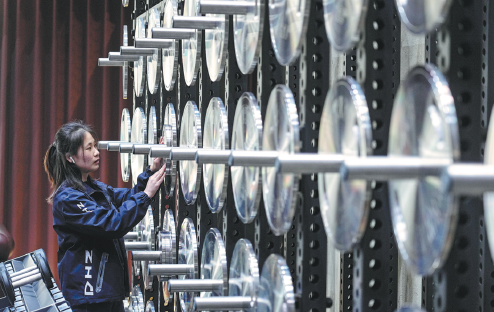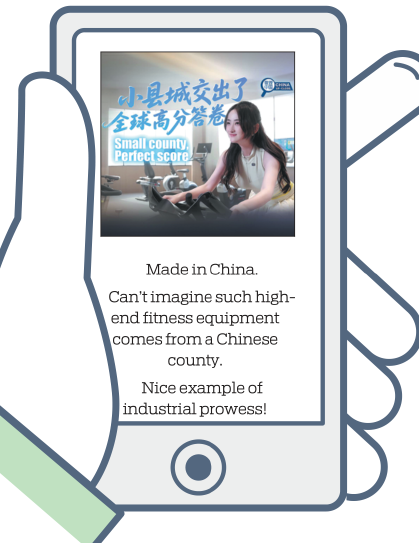Ningjin fitness equipment taking on the world
With nearly 3,000 related enterprises, any gym machine can be built, assembled and packaged without ever leaving the county

In a bustling gym in Sao Paulo, Brazil, the owner adjusted a sleek, steel-gray bench press machine. The equipment gleamed under the fluorescent lights, branded with a name few in Brazil would recognize as its origins lie thousands of miles away in Ningjin, a county of East China's Dezhou, Shandong province.
With a population of less than 500,000, Ningjin has quietly become one of the world's largest commercial fitness equipment production bases.
The small county now accounts for more than 70 percent of China's domestic fitness equipment market and its products have been exported to over 170 countries and regions.
At the center of this industrial rise is Zhou Yueming, founder of Shandong DHZ Fitness Equipment Co Ltd and a fitness coach with a bristly beard and a booming laugh that echoes through his factory.
"South American markets like Brazil are some of our major export destinations," Zhou said.
Zhou got his start in the late 1990s in a roadside workshop barely large enough to fit two lathes. Using a hammer and a second-hand welder in his backyard, he banged out the very first set of fitness equipment ever made in Ningjin.
Today, Zhou is the chairman of a company that is home to a sprawling 340,000-square-meter super factory capable of producing 500,000 units a year. He's quick to stress, however, that scale alone doesn't make it "super".
"A real super factory needs four things," he said. "Super capacity, super response, super quality and super intelligence. Without those, you're just big, not great."
The concept of "super response" is one he's particularly proud of. In 2020, when the COVID-19 pandemic brought global trade to a halt, Zhou's team pivoted, rapidly. Within seven days, they repurposed their machinery to manufacture mask production lines, helping meet local demand and keeping workers on the payroll.
"That's what we mean by response," Zhou said. "It's not just reacting fast. It's about being aligned with what the world needs, before the world even knows it needs it."
In the early 2000s, as China's domestic fitness trend began to emerge, more and more Ningjin locals began following Zhou and tinkering with gym machines. Over time, a kind of collective trial-and-error engineering culture took hold.
As orders grew, the local government stepped in. Industrial parks were zoned, export support was introduced and logistics infrastructure was upgraded.
Today, nearly 3,000 fitness and sports equipment companies call Ningjin home. In 2024, the county's gym equipment industry reached a total output value of 13.9 billion yuan ($1.94 billion), employing over 40,000 people.
The small county is also home to 11 provincial-level "little giant "firms, which refer to innovative specialized small enterprises recognized by the Ministry of Industry and Information Technology.
One of them, MBH, has pioneered automated assembly lines for home-use cardio machines and now holds dozens of domestic and international patents.
"Innovation doesn't have to mean blue-sky R&D," said Liu Xinli, general manager of MBH.
Liu said that sometimes it means figuring out how to shave 0.5 second off a welding cycle or pack a rowing machine into a box that fits better in a shipping container.
"The next battlefield isn't price. It's algorithms, data and user experience. It's not about making more, it's about making smarter," he emphasized.
At MBH, 47 different product series, with over 400 individual models, line showroom floors. Around 30 percent of them are intelligent devices, embedded with software that recognizes users' faces, evaluates their health metrics and tailors a workout plan in real time.
Liu said that the company's orders this year are up more than 40 percent, with around 70 percent of those being exports.
In the company's warehouse, dozens of containers packed with equipments are ready to leave for Brazil, valued at around $50,000 per container.
Such a sentiment echoed across town at Shandong Brightway Fitness Equipment Co Ltd, another rising star in Ningjin's fitness equipment manufacturing galaxy.
Their production line runs on full automation — laser cutters, robotic welders, automated paint sprayers — achieving over 95 percent in-house parts manufacturing. In recent years, e-commerce sales alone contributed to over 50 percent growth year-on-year.
In fact, what makes Ningjin truly unique isn't just its manufacturing muscle, it's the speed of its ecosystem. Thanks to its dense clustering of nearly 3,000 related enterprises, any gym machine can be built, assembled and packaged without ever leaving the county.
"From design to sales, everything happens right here. Every component, every screw, every tube — we can get it within 30 minutes," said Duan Tiemin, chairman of Brightway.
This ultra-efficient network has transformed Ningjin into what one might call a "county-level supercomputer". Every company a node, every supplier a subroutine, all running one vast calculation: how to make fitness equipment faster, cheaper and smarter than anyone else.
And the numbers back it up. In the first quarter alone, Ningjin's 28 major fitness equipment firms generated more than 1 billion yuan in industrial output, with tax revenue up nearly 26 percent year-on-year.
Related exports also accounted for over half the county's total foreign trade last year, and the fitness equipment sector comprised 16 of its top 20 exporting firms.
For years, Ningjin's manufacturers focused on OEM, churning out low-cost gear under foreign labels. That's changing. An increasing number of Ningjin companies are going beyond contract work and building their own brands, backed by serious R&D.
A public brand called Ningjin Fitness Equipment now covers 59 product lines, and the area has been designated as a national sports industry demonstration base.
Even Chinese consumers, long enamored with foreign fitness brands, are starting to take notice. "When people in Beijing or Shanghai walk into a gym, they're mostly using our machines," said Zhou from DHZ.
That's why branding and international marketing have become a top priority. Companies are increasingly turning to platforms like TikTok, Facebook and Amazon to build direct relationships with foreign customers.
"Our e-commerce sales now account for 70 percent of total revenue. We're not just selling machines anymore. We're selling a brand, a lifestyle," said Duan.
Despite their growing clout, Ningjin's manufacturers know the competition won't stay still. Countries like Vietnam and India are eager to capture a slice of the global fitness pie and automation is leveling the playing field, industry experts said.
But Ningjin has two decades of accumulated know-how, a dense supply network, and an almost fanatical commitment to iteration, they added.
"I'm a cardiologist, but I've done a lot of research on fitness equipment," said Prasad Andhare, a buyer from India. "I found out that most of the world's gym machines come from China, and that Ningjin is where most of them are made."
After touring several factories, he was impressed. "The quality is topnotch. They can compete with any high-end brand, even in the United States," he said.



Today's Top News
- Chinese New Year of the Horse Luncheon held in Muscatine, strengthening China-US friendship
- Year of the Horse carries message of resilience, solidarity, industriousness
- China remains anchor of stability in unsettled world
- Stage beckons, festive spirit resonates overseas
- China predicts over 285 million inter-regional trips on first day of Spring Festival holiday
- China extends visa-free policy to Canada, UK






























